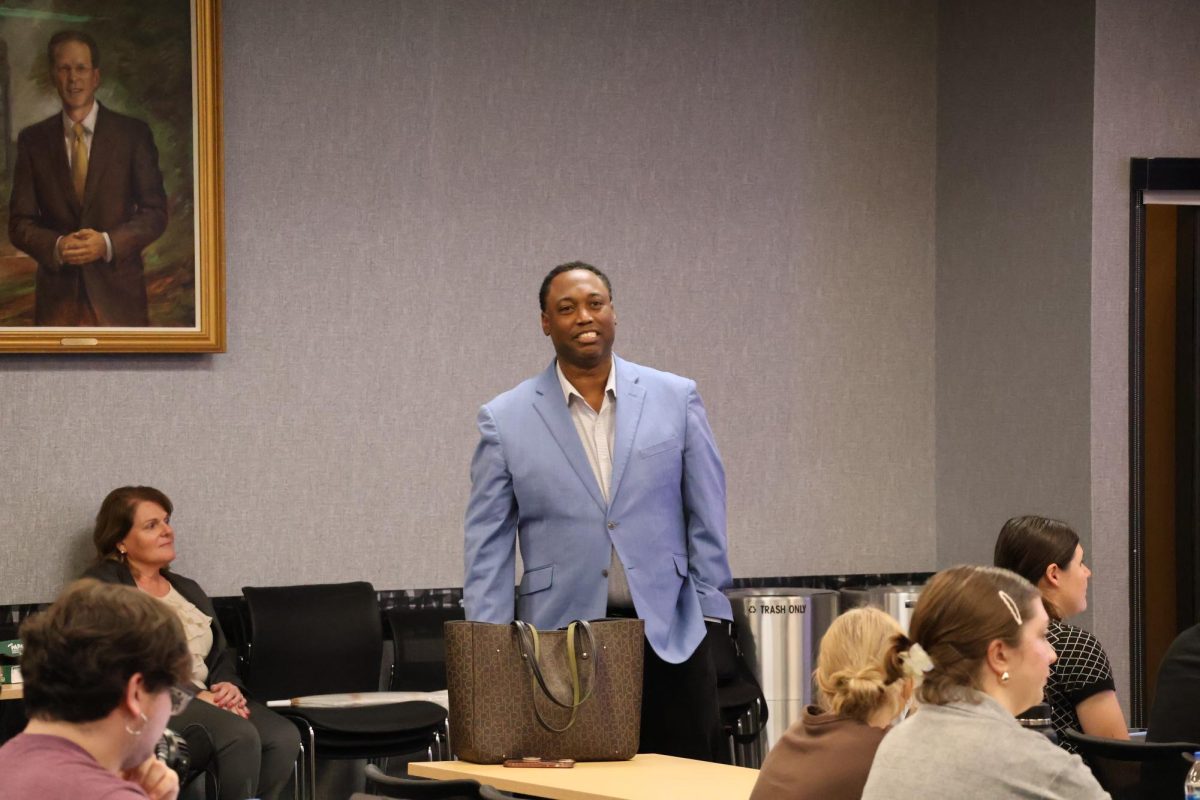“Race and the Election” was the topic of the second installment of Victor Talks and Issues on Monday evening.
Sponsored by NKU’s Scripps Howard Center for Civic Engagement and the Student Government Association, Victor Talks and Issues takes place once a month to inform students on topics that affect the 2024 presidential election. Faculty members who are experts on the topic give a presentation overview then answer questions from students.
Monday night’s speaker was history and Black studies professor Dr. David Childs.
“Race is one of the sort of elephants in the room as it relates to the election,” Childs began, addressing the crowd in Student Union 104.
Quoting civil rights activist John Lewis, Childs said that voting is one of the most powerful non-violent tools we have in our democracy.
Beginning with the history of race and how it relates to voting, Childs brought up four tactics that were used to deter people of color from voting in the United States: literacy tests, poll taxes, grandfather clauses and all-white primaries.
Literacy tests were given to those who could not prove an education above the fifth grade; if test-takers missed one question, they failed. Poll taxes meant individuals had to pay in order to vote, and grandfather clauses said that individuals could only vote if they could prove their relatives voted in the past. All-white primaries were enacted in certain districts, meaning that white citizens would determine who everyone would vote for in the general election.
Childs said these practices largely came to an end when President Lyndon B. Johnson signed the Voting Rights Act of 1964, prohibiting racial discrimination in voting.
The history and Black studies professor emphasized that racial issues stemmed from dehumanizing others and taking away their freedoms, not from being Democratic or Republican.
“I like to teach people in my classes to think beyond Democrat and Republican,” Childs said. “Let’s exist in the third space, above that.”
Childs reflected on his own personal experiences and family history, telling about how his father grew up in the segregated south. He explained how his father had to go around to the back of a restaurant in order to pick up his food and had to use segregated swimming pools and water fountains.
When it comes to the current day impact of race, Childs emphasized four challenges voters of color are concerned about: voting rights, student debt relief, racism and prejudice and police reform.
“This doesn’t speak for every Black and brown person, but for the most part, statistically, these are the things they care about,” Childs said.
Black students on average graduated with an average of $52,000 in student debt, while white students graduated with an average of $28,000 in debt.
When it comes to police reform, Childs said this didn’t mean every police officer was bad, but he recounted stories of his neighborhood being harassed by the police and having friends arrested for crimes they did not commit.
Elections in local or state governments are just as important as the presidential election, if not more, because there are more direct impacts on our lives, the professor explained. He encouraged the audience to consider running for office themselves, especially when it comes to places like local school boards.
“You don’t have to sit around and let somebody else represent you,” Childs said. “You can run for office yourself.”
The next session of Victor Talks and Issues will take place at 5 p.m. on Oct. 28 in SU 104 with Dr. Abdullah Al-Bahrani discussing “Economics and the Election.”


